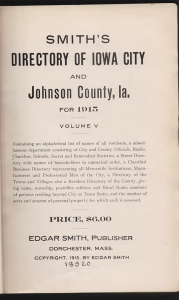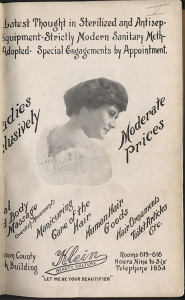Posted by Melody on Thursday, Mar 27, 2014
Yesterday I took a first look into the history of a property’s owners through the Iowa City Assessor’s website. Today we dig deeper.
The Assessor’s site only listed one sale in 2006, and that sale was code 14—“Exchange, trade, gift, transfer from Estate,” and it includes the names for both the buyers and the sellers. From there, I go to the 2nd floor Page Station’s City Directories to look for a deeper history of ownership. The listing states the house was built in 1963, so I start with the 1963 Polk Directory and look the house up by its address. Hmm. The Directory lists the property under the same family name as the name on the Estate. Could this mean the house was in the same family for 50 years? I grow hopeful.

I decide to look for the obituary of the family member who died in 2006. ProQuest has the Iowa City Press Citizen archives from 2002 forward. Plugging the family name into the search bar brings up enough articles and obituaries that I don’t have to do an advanced search. I find the obituary for the matriarch who died in 2006 (obituaries often list home addresses—score!) The obituary tells me she married her high school sweetheart, worked for the UI and ACT, and supported her husband’s masonry business.
Masonry business? This new clue practically REQUIRES me to go back to the city directories. The house has two fireplaces, and if professional masons lived there, I am going to have tons of confidence in the brick work. Before I go back to the directories, I discover the patriarch of the family died before 2002, so I can’t get his obituary from ProQuest.
Where can I turn to next? Look for tomorrow’s post to find out.
Posts in this series:
House History Hunting Part 1: Good deeds go unpunished
House History Hunting Part 2: Raising the dead (currently reading)
House History Hunting Part 3: A local index like no other



I am breaking out of my nonfiction and fiction groove to recommend the literally loveliest thing I've read all year. Kids who have the patience to sit down and listen to a good story, well told, will cuddle up with you to enjoy this picture book. But not my kid! As a 6yo, he thinks books like this are for preschoolers. Joke's on him, tho, these beautiful books are also for art-appreciating adults. Gerard Dubois's illustrations feature clean and elegant lines with expert level coloring. If you love fantastic illustrations and an uplifting story about the strength of a community and the wonder of our world, you will love this picture book. -Melody